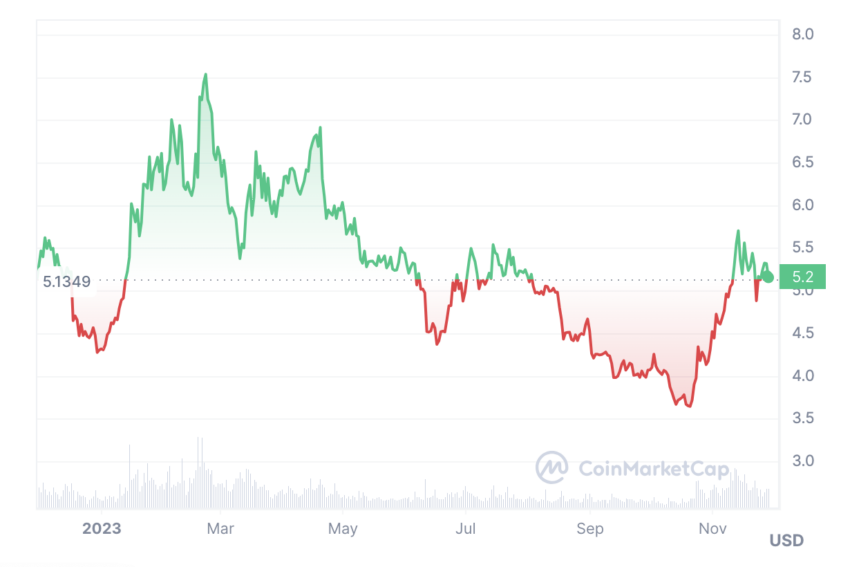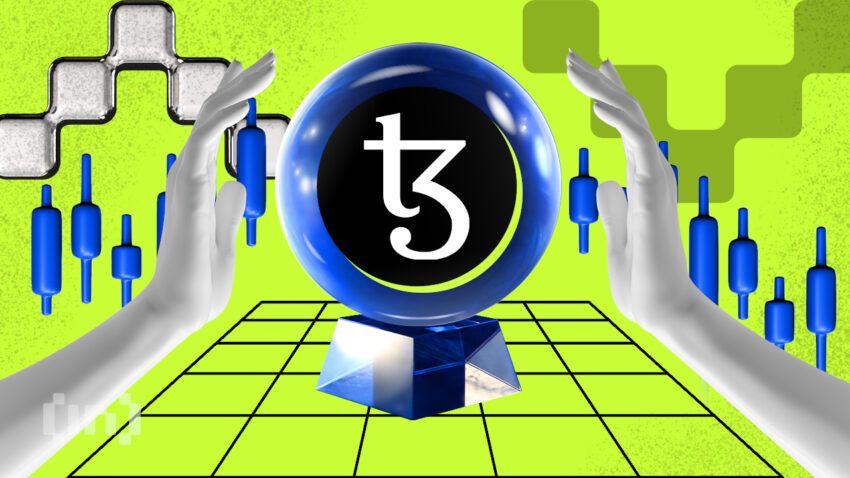A new wave of investors has entered the crypto industry, each seeking the best returns from their assets and ways to grow their income with cryptocurrencies. Moreover, the emergence of proof-of-stake projects and DeFi platforms has created unprecedented opportunities to increase income through staking coins. In this guide, we will explore the best staking coins and platforms and examine the top alternative staking options available.
What does staking crypto entail?
Staking coins can be staked on a proof-of-stake (PoS) blockchain. PoS is the consensus mechanism behind a blockchain that ensures that the Blockchain functions properly.
Staking coins gives holders decision power on the network, allowing them to vote on governance decisions and generate an income from their assets.
How do staking coins work?
Staking coins work by staking a coin on a PoS network by either holding coins in a native wallet or locking them in a smart contract to operate nodes. The coins are used to help validate transactions, operate nodes, and maintain blockchain health.
Rewards are then earned based on the number of coins you contribute to the staking platform.
What coins can you stake?
The most popular proof-of-stake coins include Synthetix, Algorand, Cardano, Polkadot, Avalanche, Cosmos, and Tezos.

Emerging proof-of-stake projects are diversifying the crypto investment landscape, offering varied staking options on altcoins. Now, these platforms seamlessly incorporate stablecoins, known for their fiat-pegged stability. This integration offers dual benefits: staking rewards and price stability. As a result, it makes PoS platforms more appealing and versatile for investors.
Is staking coins profitable?
Many alternative staking platforms are now available. However, staking coins through a proof-of-stake blockchain remains one of the best ways to grow your income passively.
For long-term holders and “whales,” staking your coins can prove to be highly profitable and offers far greater incentive than holding your coins on a wallet or exchange.
How do I find the best staking platforms?
Staking is growing in popularity and becoming an essential part of the industry. Therefore, it pays to conduct thorough research and find the best staking platform suited to your needs. This guide provides the basics to assist you.
The best staking coins
Many staking coins now offer generous rewards for participation in a staking network. Notably, the most popular ones have proven their worth during the recent surge of interest in PoS coins and projects.
Algorand

Staking on Algorand is easy to configure and offers generous rewards for holders. Users can get started by first downloading the Algorand Wallet and then transferring their Algorand to the wallet. Once your Algorand has been transferred, rewards of up to 6% are earned automatically, with reward distribution taking place approximately every 9 minutes.
You can stake on alternative platforms, such as exchanges and staking providers. However, staking on the official Algorand wallet offers the highest percentage returns on your assets. This is because no commission on earned rewards is taken through the official wallet.
Cardano

Staking your ADA on the Cardano network means your assets represent a stake in the network, with the size of the stake equal to the amount of ADA staked. Users can earn rewards in two different ways: by delegating their stake to a pool operated by someone else or by operating their own stake pool.
Staking ADA can yield rewards of nearly 7%. Consequently, delegating ADA to a high-earning pool has become the most popular option. This process is user-friendly and straightforward to configure.
Polkadot

Polkadot has recently emerged as a real contender to Ethereum in the race for Blockchain superiority. Stakers can earn up to 16% in rewards by becoming a “Nominator” in the Polkadot blockchain network.
It should be noted that to become a nominator, you will need to hold a minimum amount of DOT required by the network to participate, which differs based on network usage. The setup through the official wallet extension can also be long and tedious to configure.
Now, alternative platforms are starting to offer rewards of 10% on Polkadot, which can be earned simply by holding Polkadot on their platform.
These platforms also have no minimum required amounts to stake.
Tezos

Staking on Tezos is most commonly known as “Baking,” and much like Cardano, holders can choose whether to delegate their assets rather than operate a node.
All users can now participate in the staking process, earning up to 6% in rewards. The node operator distributes these rewards to delegators. Furthermore, configuring the delegation process is straightforward. Users can complete it through supported wallets that offer a delegation interface.
Like Algorand and Cardano, Tezos can be staked on other platforms. However, these platforms only stake the address, meaning you may incur extra fees and earn less than staking through supported delegation wallets.
Alternative ways to earn staking rewards
Recently, many alternative platforms such as major exchanges, crypto savings accounts, and DeFi platforms have emerged for those looking to stake their assets and grow their income.

These platforms provide staking that is simpler to configure, requires minimal maintenance, and provides relatively equal rewards for staking coins. With the introduction of these new platforms, coin holders now have many great options to choose from.
They provide very generous rewards and incentives for staking whilst removing the technical knowledge required.
Exchanges
“The main advantage of staking is that one can earn digital asset rewards by helping to secure a blockchain network without having to trade or lend their assets, thereby minimizing market and counterparty risk. But with every type of investing, especially in crypto…”
Andrew Keys, DARMA Capital Managing Partner: CoinDesk YouTube
Major exchanges now offer staking for a variety of assets. Consequently, the rewards vary depending on the asset chosen and the staking duration.
Exchanges that provide staking include:
- Binance: Enables staking of a wide range of cryptocurrencies, offering competitive yields and easy access for users.
- Coinbase: Provides a user-friendly platform for staking various assets, with added security and educational resources.
- Bitfinex: Offers unique staking opportunities for multiple assets, catering to both novice and experienced traders.
- Kraken: Features diverse staking options with attractive returns, emphasizing security and ease of use.
- Huobi: Supports the staking of several popular cryptocurrencies, offering a mix of flexibility and profitability for its users.
- Poloniex: Allows staking of various digital assets, focusing on simplicity and integrating innovative staking features.
Binance provides the widest coverage for staking coins, offering over 20 crypto assets with annual yields ranging from 1% to 16%. Meanwhile, exchanges deduct a small percentage from your staking rewards. Therefore, it pays to shop around since staking fees and the range of coins available vary among different exchanges.
Staking on exchanges is easy to configure and set up, and due to many cryptocurrency investors wishing to hold their coins on exchanges, native staking platforms like these have proven to be very popular for the more novice investor.
Crypto savings accounts
Crypto savings accounts are another safe option for investors that can return 1-20% staking rewards on your assets. Whilst not technically “staking,” you can hold your coins on the platform and earn rewards due to your assets providing liquidity for trading and lending services to other institutional players.
On the most popular platforms, staking can return rewards of between 2-6% on market-leading coins like bitcoin, ethereum, and Chainlink, alongside many other altcoins that offer native staking.
The most popular options available are BlockFi, Celsius, and YouHodler, all of which provide a simpler way to “stake” your coins and grow your income through your assets.
DeFi Platforms for staking coins

DeFi platforms have recently grown in popularity due to their simplicity and high earnings potential. These platforms secure your assets via a liquidity pool or smart contract, meaning you become a liquidity provider for the platform.
Rewards are then generated from fees and interest earned on the platform. The yields that you earn range from 20-100% APY and are based on the liquidity pool or platform that you choose.
The most popular DeFi platforms, like Uniswap and PancakeSwap, offer staking through providing liquidity to the platform.
You can achieve this by staking two coins into a liquidity pool or through single-sided staking, which involves staking the native governance token to earn staking rewards.
Both options are relatively risk-free and can earn ample rewards based on the type of coin and amount of time staked.
DeFi is now flourishing across multiple networks and is proving itself to be a front-runner for those looking to earn income from their assets.
Staking providers
Many newly launched “all-in-one” staking providers offer comprehensive platforms where users can choose the coin they wish to stake and start staking on their platform with minimal set-up involved.
These providers are similar to staking coins on exchanges with the added advantage of larger staking pools and more native support for various staking coins. They usually take a cut for their services but can remove the sometimes complicated initial set-up, technical knowledge and maintenance involved with operating your own node or being a delegator on a staking network.
The most popular staking providers include MyCointainer, Stake.Capital, EverStake, Staked, and stakefish.
Maximize your crypto wealth
Staking your coins, whether through an official wallet or a platform, offers a great chance to enhance your income and earn passively from your assets. Plus, you’re now more informed about coin staking and using cryptocurrencies to increase your earnings. Our guide aims to assist you in finding the ideal staking option. Remember that the earlier you begin, the more you stand to gain.
What is staking in the context of cryptocurrencies?
How does staking differ from mining?
What are the benefits and risks of staking coins?
Should I stake crypto?
How much profit can I make from staking?
How long does staking crypto take?
How much do I need to start staking crypto?
How long does it take to unstake crypto?
Disclaimer
In line with the Trust Project guidelines, the educational content on this website is offered in good faith and for general information purposes only. BeInCrypto prioritizes providing high-quality information, taking the time to research and create informative content for readers. While partners may reward the company with commissions for placements in articles, these commissions do not influence the unbiased, honest, and helpful content creation process. Any action taken by the reader based on this information is strictly at their own risk. Please note that our Terms and Conditions, Privacy Policy, and Disclaimers have been updated.



